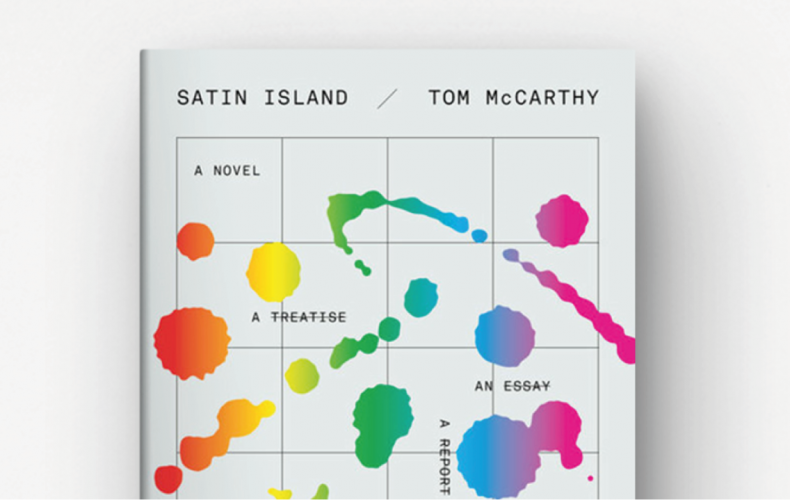I haven’t entirely decided how to take Satin Island. It’s either a clever and highly nuanced satire of the knowledge and consultancy sectors at their most beard-stroking and hubristic. Or it’s a rather abstract, beard-strokingly impressionistic musing on ‘the patterns that surround us’ and the connectedness of, well, everything. Either way, it’s an impressively imagined rendering of our sector’s voice and culture - and it’s hugely original.
I’m inclined to see it as an elegant satire of the sector. Frankly, there’s not nearly enough satirising of our sector.
Here’s our almost nameless narrator, ‘U’ (you? Kafka’s drifting ‘K’?), an ethnographer-anthropologist working on an undefined project of global importance at a global company, headed by a talismanic surname, ‘Peyman’ (Sir Martin perhaps?) - a man who’s a sage to ministers and statesmen. ‘U’ is paid to think about things on what appears to be a rather vanity, ‘look clever’ footing (having once written a noted work on night club culture). That will already ring a bell curve with our peers.
‘U’ opines on a kaleidoscope of ‘things’: parachute-tampering deaths; the slow movement of oil in oil spillages; the cargo cult in Vanuatu. He suffers a form of writer’s block, seeking to write a heavily anticipated ‘Great Report’, while not knowing its subject or purpose (anyone in our sector who’s read this novel is certain to use ‘The Great Report’ label for their next piece of work). He has an artist’s eye and his reflections on the connections between forms of movement are often a delight (Lagos traffic and buffering; tumours and oil spills; jellyfish and parachutes). They reminded me of looping projector installations in contemporary art galleries. (Tom McCarthy has mentioned a phase in the gestation of the novel where he found himself enthralled by repeat footage of oil spills).
The novel does a fine job of rendering some of those all too common pretensions of the consultancy world, and the desperate efforts many of us make to be seen to be doing anything but ‘selling stuff to people’. A culture that co-opts the language of the art world, the design world, the world of people-who-actually-make-stuff world. Whence such job titles as ‘Cultural Storyteller’, ‘Ethno-Curator’ and ‘Behavioural Engineer’. (‘No, you’re not getting retitled ‘Financial Storyteller’, mate. You’re staying ‘Payroll’’). It even resembles a consultancy report, with its short, numbered sections (1.1., 1.2…) and foyer coffee-table friendly squarer form.
It also captures the way idle thinking can quickly turn into orthodoxy (remember ‘Brand Love’?) – in the way the industry is currently mudwrestling with ‘storytelling’. We learn that Peyman has started using one of U’s passing constructs at a very high level. ‘U’ is later asked by Peyman’s assistant ‘to bring up whatever you’ve got’ to a rare meeting – even though ‘U’ hasn’t actually written anything. That alone seems to do the trick. It all feels like one glorious suit of Emperor’s New Clothes, though ‘U’ is no ‘Lucky Jim’ chancer – he’s terribly earnest.
Throughout, ‘U’ is an enchanted observer of ‘things’, but a pretty dreadful empathiser with and observer of people – something one sometimes hears said about a sector that’s supposed to be about understanding ‘real people’. His tone is wonderfully clinical, elevated and removed. His lover tells him a shocking story about how she was seized by the police during an anti-globalisation protest, and was forced to act out a bizarre, semi-sexual ballet for an unknown senior official. ‘U’ doesn’t really pursue this – it’s not that interesting to him. Likewise, a colleague has a terminal illness, which cues some thoughtful musing on the idea of attaining a kind of immortality by phasing text messages to send beyond the grave (but not much sympathy).
Oh, we do see flashes of our hero fantasising about edifice-tearing and sabotage, but at each point normal service resumes. He’s a brilliant, cold fish. I have a London-based consultant friend of a friend about whom we sometimes affectionately say ‘He finds Wallpaper magazine a bit provincial’ and ‘He can read Monocle with a straight face’. He can talk in depth about Sao Paulo pichaçao, but can’t name a single character from Coronation Street, past or present. (Of course, it wouldn’t be him if he could). That’s ‘U’. If you work in the knowledge and consultancy sector, he’s eerily familiar.
So, think: ‘Monocle - the Novel’. I really enjoyed it. It is probably the great novel of ‘our’ sector for this century. Ironically though, for a novel that channels marketing and consultancy so well, I can’t see it shifting many units or taking the Booker Prize, despite making the longlist this month and also - fittingly –being available in a traditionally bound luxury edition for no less than £185. Tom McCarthy is a literary innovator and his previous two novels are equally smart and tricksy, but he’s no crowd-pleaser.
If only he’d called it ‘The Girl with the Satin Island’. Or ‘The Strange Young Ethnographer Who Thought of Oil Spills and Dreamed of Staten Island’. I’m seeing a cover with an enigmatic silhouette on it, walking into the distance; a Richard and Judy endorsement in the bottom right corner. Come on, consultants. Let’s workshop this.

